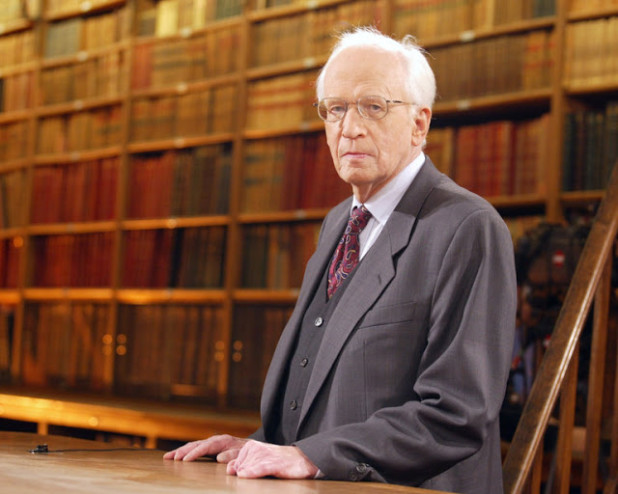Diversity Macht Frei
August 24, 2016
The German historian Ernst Nolte died last week. A bit like David Irving in Britain, Nolte had become something of an outcast in the world of academe, although his banishment was not quite as severe as Irving’s, Nolte still being accorded occasional public recognition. Like Irving, Nolte was branded a Holocaust denier. But he didn’t actually deny that Hitler had killed lots of Jews. He simply asked whether what Hitler did was so different from what Stalin did, whether exterminating people because of their race was so different from exterminating people because of their class or political convictions. He also pointed out that the Communist mass murders came first; and that what Hitler did was in response to them.
The Jews, it seems, having successfully manufactured in the public mind a form of demonic wickedness called “Holocaust Denial”, are continually redefining its boundaries. Originally “Holocaust Denial” meant a simple denial that the Nazis engaged in the mass extermination of millions of Jews. Then it was extended to disputing some of the details of how the extermination took place. David Irving, for example, as far as I know anyway, not having delved deeply into his work, does not deny that large numbers of Jews were killed by the Nazis. He quibbles over the details of where and how this took place and he argues that Hitler himself did not order the extermination, it being carried out by subordinates without his knowledge. But, for this, he was branded a “Holocaust Denier”.
Nolte – again as far as I know, because I haven’t read any of his books, although I now intend to – didn’t even quibble about the details of the conventional Holocaust narrative. He questioned only its sacral significance, pointing out other similar things that had happened previously and around the same time. He refused to engage in the limitless self-flagellation that the Jews expect of all Germans and Europeans. And thus he came to be branded a “revisionist” and an antisemite in the dispute among historians known as the Historikerstreit.
A core element of the Historikerstreit of 1986 and later was the claim by Nolte that the “Gulag Archipelago” was prior to Auschwitz. This argument was already a basic trope in Nolte’s study in 1974. He wrote that “systematic eradication of complete groups of the population” was “first mentioned in Soviet Russia.”[xiv] Several times he referred to supposed “threats of eradication” of the “bourgeoisie” in order to emphasize that annihilation or eradication was not at all specific to the Shoah. Nolte was obsessed with pointing to these mostly left-wing (or Soviet) ‘threats,’[xv] he referred to dozens of examples of alleged “destruction” (or eradication) throughout his book.[xvi] The aim was obvious: he denied that Auschwitz was a “rupture of civilization” (Diner). In addition, he said that the “destruction of European Jews” was “nothing but the second attempt” “to solve problems of industrialization by eliminating a big group of people.”[xvii] The Holocaust was a “modern attempt,”[xviii] not at all unique to the fate of the Jews, he claimed.
Here the Jew Clemens Heni complains that a few German newspapers did not apply the anathema sentence to Nolte severely enough; they dared to give him honourable mentions when he passed away. Note this tirade of hysterical emotion that could reasonably be described as anti-goyism. If anyone spoke about Jews in the way that Heni speaks about Germans, he would be prosecuted for “hate speech”.
As I have shown, Ernst Nolte’s antisemitism is mainstream in today’s Germany. Three leading German language dailies embrace and honor Nolte, the Frankfurter Allgemeine Zeitung (FAZ), the Berlin based Tagesspiegel and the Swiss Neue Zürcher Zeitung (NZZ). They are silent about Nolte’s antisemitism from 1974, his anti-Zionism and his anti-American and Holocaust distorting equation of Vietnam to Auschwitz (as shown, for him, Vietnam was even worse than Auschwitz).
These forms of antisemitism and rewriting of history go unchallenged in today’s Germany or Switzerland, respectively. Nolte was a typical right-wing extremist German insofar as he combined hatred of Jews, flirting with Holocaust deniers, explicit denial of the unprecedented character of the Shoah and hatred of Israel.
In recent years, there has been a push, mostly from the countries of eastern Europe, to put the atrocities of the Communist and Nazi regimes on an equivalent moral footing. The Jews have been frothing hysterically about this development, not least because it might lead to awkward questions about who exactly was involved in these Communist regimes and whether they might have been actuated by racial animus of their own.
In the English language, Timothy Snyder broached comparative discussion of the Nazis and Communists in his book Bloodlands. He, too, of course, immediately ran into the same gibes from the same people; although he is hardly a truth-telling hero himself, having pitched into the Ken Livingstone controversy earlier this year to deny, in a cravenly contrived way, that “Hitler supported Zionists”. No doubt he was hoping to win some plaudits from the Powers that Be. But I fear it won’t do him much good.
Two English-language interviews Nolte did are available here (link) and here (link).
 Daily Stormer The Most Censored Publication in History
Daily Stormer The Most Censored Publication in History


